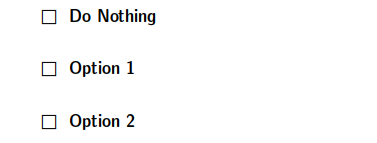Have you ever had to sign up for something at work or school, like heath insurance or a savings plan? Usually such plans have many options. I heard an amazing statistic some time back that no matter how good of deal one of the options might be, a huge percentage of people will not choose it, no matter what. Even if one of the options was something like “30% discount”, and there would be no reason not to want it, there will still be a large percentage of people that won’t “opt” for it. These same people would be glad to have the “30% discount”, and if that was just the default option they would not select an option to “opt-out” of the “30% discount”. This large group of people will basically just stick with whatever the default options are no matter how good or how bad that is!
Before you judge these people too harshly and say what idiots they are — I admit I’m probably one of them, and maybe you are too! Ever since I heard the statistics about this behavior when signing up for health insurance some time back, I’ve been sensitized and tuned in to watching for it in all facets of life, and I see it everywhere!
I can’t tell you how many times now that I’ve seen someone tell how to use some new software or other tool, and say something like :
“OK, now, the first thing you want to do when you start using this software is go in and change all these default settings that control A, B, and C, and this will make everything so much more efficient and productive and easier to use ….”
I just want to scream and say :
“Why don’t you just make those the default settings!!!” I might not know how to change the settings, or I might not know there were settings like these that could be changed, or I might even just be too lazy to change them, but whatever the reason is, it wouldn’t matter if the software maker just put in the common-sense settings from the beginning as the default settings!!”
Some people just can’t understand this whole concept. They think everyone will be so invested in knowing everything about their heath plan, or their software, that as long as the options exist, people will spend all kinds of time selecting and optimizing the options, and it won’t really matter what the starting options were.
Other people like like Apple (or at least Steve Jobs) do get it. People don’t want to spend tons of time configuring options or preferences or settings, they just want to use the software for the stuff they’re interested in.
So what’s the point of all this, just to rant and vent off frustration? No, indeed, there’s a great deal of power here to be harnessed :
1. Realize the human tendency to blindly stick with the defaults, and watch out for opportunities gain a lot of value by choosing non-default options. (In a perfect world the default options would almost always be a good choice, but it’s not a perfect world, and often the default options are purposely set to a bad choice just to exploit us.)
2. For the things you have control of, set things up such that the default option is the thing you want to happen. For example if you want to do something at work that you think would be a great idea, you could ask your boss :
“A, B, and C seem like really good ideas. Can I start working on them”
or you could reword it to be
“A, B and C seem like really good ideas, and I believe that I’ll be able to start working on those soon as the opportunity arises. Just let me know if you have any concerns or additional instructions. Thanks!”
In the first case, your boss has to give you permission to do it. In the second case you still acknowledge your boss is in charge, and you’ve given him the default option of him or her doing nothing means letting you do it.
